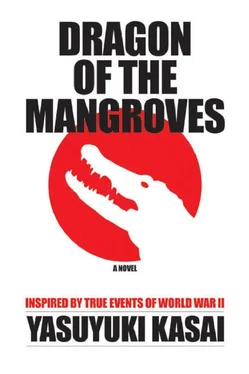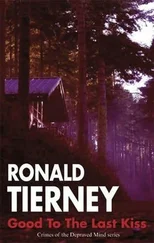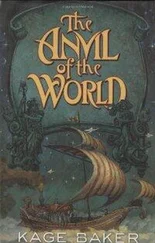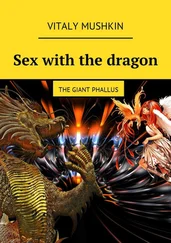Sumi then heard Pondgi say, “Master Sumi. I’ll bet they must be alive. Let’s go help them, quick.”
Sumi’s rescue party reached Kalaidaung Creek on the morning of their third day on Ramree Island.
Mangroves covered almost all the coast there. Every tree was propped by many stilted roots and fanned out its boughs and branches, all luxuriant with thick green leaves, in all directions. The odor of the sea filled the air, and the humidity was stiflingly hot.
The rescue party went north along the creek. Now they could see the skyline of Hill 509 in the morning sunshine on their left. Sumi was relieved to know he had ever taken the right route. According to the map, they had only ten-odd kilometers left to Yanthitgyi.
Considering the fact that some garrison soldiers surely had been spotted and drawn fire on their way the previous night, he could hardly think that all of them had made their way to the continent, although he didn’t know the magnitude of the creek-crossing operation. Likely, the majority may have remained near Yanthitgyi or Myinkhon Creek to wait for the next opportunity.
Little progress was made, even though they only had a short distance to their destination. Deep mud and entangled roots hindered them. They were often forced into going this way and that in the maze of creeks, running unrestrained through mangroves in all directions and cutting off their route abruptly. The map was of no use anymore. And, in addition, Sumi submerged his precious compass by mistake while he was wading in the creeks. He immediately made temporary repairs to it, but the needle only swung unsteadily and never indicated the north as decidedly as before.
Peaty lands sometimes replaced mangroves. Instead of communities of reeds like the one that had harassed them the previous night, low weeds covered these bogs. The color was verdant despite the dry season, and water flowed gracefully, filling up creeks and running through greens, which made the scenery look like a landscape garden.
After a while, a drone fell on them. Eight fighter planes flew across the sky with their wings flashing in the morning sunlight, ripping the peaceful serenity.
They were Super Marine Spitfires, the masterpiece of British fighters. This air company might be headed for an airfield in Akyab or Chittagong. It flew away to the northwestern sky without breaking the well-ordered formation.
The noise brought Sumi, who was absorbed with the scene and not with the real world of war, back to reality.
The rescue party looked for a way through the mangroves as often as possible to keep them out of any airborne gun sights. After some time, they began to hear the sporadic roar of cannons. Unlike those of the previous day, these were heavy bass sounds, reverberating their insides. Some friends remained on that island, and they were resisting. This also meant the garrison had failed in its mass creek-crossing operation the night before. Sumi realized the turn of the rescue party drew near at last.
Shimizu came closer to him. “Lieutenant, I think everything is going to be fine,” said Shimizu.
“What do you mean?”
“Uga hadn’t yet fallen into enemy hands, at least when we landed on this island. Guys here have stayed there for more than a year, so they should know the geography well. Some guys can head for Uga by themselves if they’re given a shifting order.”
“You mean an official shifting order to Uga?” asked Sumi. “Why do you think they can get one at this late date?”
“You left the two signalmen in Uga,” Shimizu explained, “and those guys have a transmitter-receiver. The HQ in Taungup knows we’ve stolen into Uga by their wireless report. The HQ can’t be in stony silence if any radio set of the garrison is still alive. The garrison might have already got an order to shift to Uga. If so, things will take a turn for the better.”
At first, Sumi felt like Shimizu was too optimistic and told him, “That’s very wishful thinking.”
“Maybe you’re right,” Shimizu said and grinned cynically, “but it’s still possible that what I said could be true.”
Sumi didn’t say anything. He didn’t know whether Shimizu was right, but he understood that he would know nothing until he went there, as Shimizu had said the previous night.
Early that afternoon, a creek blocked their way once again. Sumi and his men reluctantly waded into the water. It was calm. However, it was unexpectedly deep, enough to reach their shoulders at its middle. Each soldier raised his gun higher in the air and made his way in the water cautiously, as if probing something on the bottom with his toe.
When he dragged himself up onto the opposite bank, Sumi saw a vast paddy, now all dried up, spread there. After all his men had gotten out of the creek, he scooped and tasted the water through which they had just waded. It wasn’t saline but fresh. This creek might be one of irrigation canals for agriculture. He could see some farmhouses scattered in the distance. All of these signs hinted this probably was an outlying settlement belonging to Yanthitgyi.
He took out his long-used map and looked for a place where the troops coming back from Myinkhon Creek might likely withdraw anew. Hill 604, located northwest of Yanthitgyi, was one option. Any other place was unfit to hide them from enemies and to set a position easily in a short time. It was still far from there. But he felt it was no distance at all, considering the long journey up to then.
However, Sumi deemed it dangerous to cut across that broad paddy under the eyes of locals and especially of the enemy planes flying this way and that. So he decided to wait for sunset.
The soldiers rested in the shadow of trees growing along the creek. Sumi also sat with his back against a tree trunk. He stared blankly at the soothing paddies, trying to think of nothing. A fresh breeze caressed his body, which was covered with sweat and mud, making him almost fall to sleep.
Suddenly he heard the dry rattling sound of a wooden clapper. Before long, a cow came along, probably belonging to a nearby farmer. Walking on the levee leisurely, it passed in front of him.
The cow headed straight for the creek they had just waded across. The
moment the cow stuck out its head to drink, a huge thing leaped out from the water. It was so fast that the whole figure was blurred. When it clutched the muzzle of the cow, it was still long enough for Sumi’s eyes to focus for the first time.
He saw it as big white jaws, each purfled by a row of pointed teeth. The cow straddled on the spot and offered resistance. It was an adult with a hefty body.
The muscles of its rump bulged, as if flaunting its physical power.
The next instant, the big jaws jerked and gyrated. The thing so powerful it flipped all four legs of the cow in midair without even giving it time to bellow.
Many sprays and splashes went up when the cow fell into the water, and the creek was thrown into a complete tumult.
Sumi was astounded, and couldn’t figure out what was happening. However, the commotion in the water came to a sudden stop, and the two animals silently disappeared into the water. The dead tranquility then returned to the surface as if nothing had happened.
Sumi turned pale in astonishment. He couldn’t imagine the power required to drag the cow into the water in an instant, without the slightest hesitation in dragging its gigantic body. It was a diabolic power only held by carnivorous animals.
Sumi had just witnessed the power of a crocodile for the first time in his whole life.
Then he found Shimizu squatting just beside him. Shimizu’s big, sturdy body somehow looked smaller than usual.
“Oh, Sarge! Did you see that?” Sumi asked. He noticed himself shaking and tried to stop it but couldn’t.
Читать дальше












